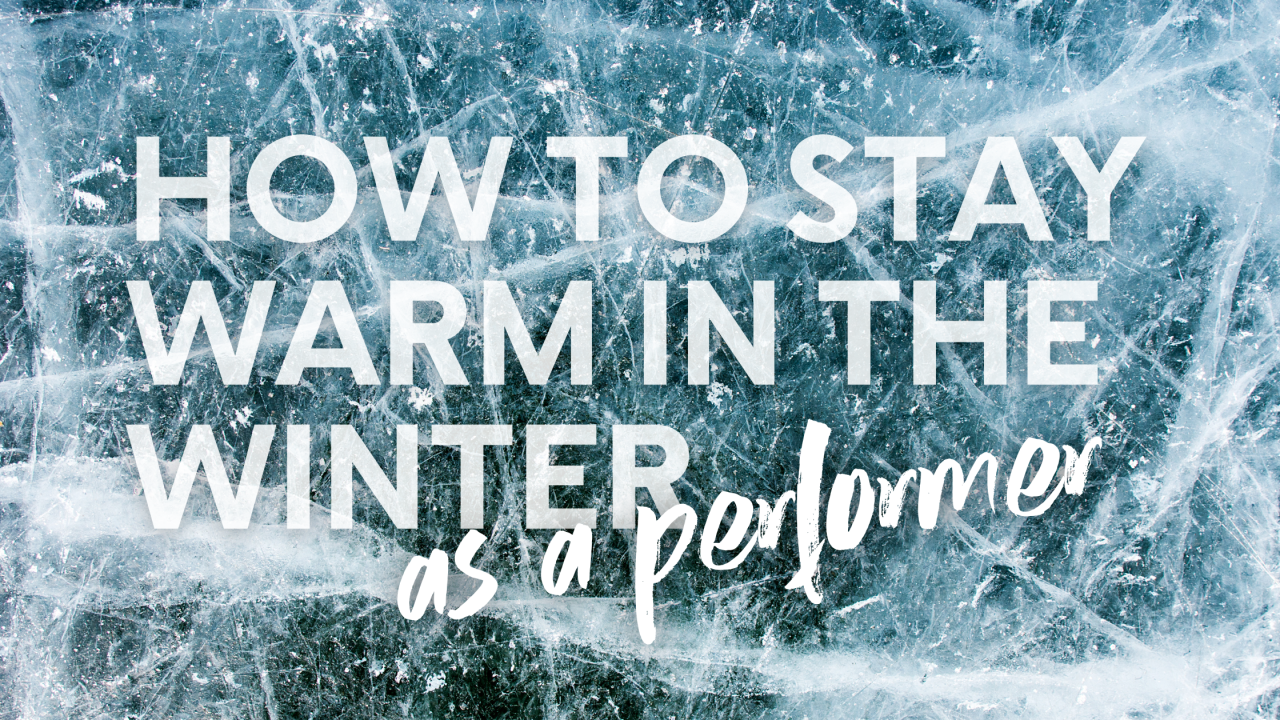As winter’s chill settles in, performers confront the task of staying warm to and from rehearsals and sometimes even during performances! We’ve asked performers like yourself their favorite tips that will guarantee a seamless rehearsal during the winter season. As a bonus, Broadway Licensing Global’s Digital Marketing Associate, Tiara Nock, sat down with Dr. Kirsten C. Kunkle to learn more about her tried and true winter vocal health tips.
Layer Up Like a Pro:
Invest in a quality pair of moisture-wicking base layers to keep sweat away from your skin and add insulating layers such as fleece for heat retention. Look for items that won’t interfere with movement in case your rehearsal space is cold.
Warm-Up Rituals:
Prioritize a thorough warm-up routine to get your blood flowing before hitting the stage. Warm muscles are less prone to injury and will help you combat the chill more effectively. Incorporate dynamic stretches and light cardio exercises into your pre-performance ritual.
Portable Heating Solutions:
Consider incorporating portable heating solutions into your backstage setup. Battery-powered heated blankets, thermal packs, or even small space heaters can make a significant difference in maintaining a comfortable performance environment. Ensure safety protocols are followed to prevent accidents.
Hydration is Key:
Stay hydrated, even in the cold. Cold air tends to be dry, and dehydration can affect your overall well-being and performance. Drink warm beverages like herbal teas or hot water with lemon to keep your body hydrated.
Winter Vocal Health:
Broadway Licensing Global’s Digital Marketing Associate, Tiara Nock, recently sat down with the leading Native American soprano in today’s classical music world, Dr. Kirsten C. Kunkle, for her winter tips for singers.
Tiara Nock: How does the winter weather affect your vocal cords, and what specific challenges does it pose for singers?
Dr. Kirsten C. Kunkle: Everyone is affected differently by environmental factors, based on their own biology and physiology. Air is drier and colder, and regulating your body temperature is more difficult when dealing with temperature changes and the differences between indoor heat and outdoor cold. The biggest challenge that I have seen with my students and my own singing is to learn what triggers make things difficult for you specifically. These challenges could include hydration, air pressure, temperature, and mindset regarding singing through these obstacles.
Tiara: Are there any particular vocal warm-up exercises or routines you find especially beneficial during the colder months?
Kirsten: I think that the best thing anyone can do is to get to your venues for performance or rehearsal early to adapt to any temperature changes, hydrate well at all times, and keep a positive mental mindset that your body can handle these changes. Often, I think that people decide that something should be more difficult, and that makes them add tension and forget to focus on their breath. Maintaining the same routine that works well for you year-round is probably the most beneficial thing one can do.
Tiara: Do you make any adjustments to your diet or hydration habits to support vocal health in winter?
Kirsten: It is beneficial to hydrate well year round, especially in summer when the body is constantly in need of more water from perspiration and in winter when we tend to forget to hydrate as much as necessary. Water is always the best choice, but do whatever works for you. Some people actively avoid caffeine, dairy, or alcohol. Each body is different, and tolerance of these substances is individual. Diet and habits wise, it will always benefit singers most to avoid smoking on any level, keep physically active, and eat healthily. Prevailing thought has always been that cardiovascular exercise is beneficial, especially low-impact exercise like swimming if that is an option. Again, what your body can tolerate is individual, and any physical routine or diet changes are best to be cleared with a physician.
Tiara: Are there specific environmental factors, such as heating systems or dry air, that you address to maintain optimal vocal conditions during the winter?
Kirsten: Yes, heating systems can absolutely make extra hydration necessary. Also, more bodies in rooms and performance venues can make everything feel drier. The best thing a singer can do is to be prepared, dress warmly when traveling or navigating indoor/outdoor environments, adjust to the heat slowly, and continue to hydrate. Some people like to use humidifiers, which can be helpful.
Tiara: Do you use any specific vocal care products, like throat sprays or lozenges, to help protect your voice in colder weather?
Kirsten: I do not use any throat sprays or lozenges at any time of the year to help with singing. I find that they often act as a “band-aid” when dealing with vocal fatigue or vocal insecurities. If there is a vocal health issue that is making someone feel that they need to use something like a throat spray, it is best to consult a trusted voice pedagogue for vocal technique work. If there is concern about a lingering issue that only a throat spray seems to help, it may be in your best interest to see about getting a scope from an ENT (ear-nose-throat physician) to make sure there isn’t vocal damage. The best thing you can do is not push the voice and keep healthy vocal production, hydrate, sleep, and generally take good physical care of yourself.
Tiara: During this season there are a lot of opportunities to go caroling. How does outdoor performance in winter conditions impact your vocal preparation and care compared to indoor performances?
Kirsten: Outdoor performance, in the cold, is a difficult situation for most people. Everything seems more difficult because it is usually harder to breathe. The tendency is to push to get the sound out. Singers need to be aware that they must trust their bodies, focus on keeping airflow consistent, and sing by “feel” instead of sound. Learning to trust the limitations and needs of your own body is the best thing anyone can do as they approach singing both indoors and outdoors.
Tiara: I appreciate you taking time out to answer my questions! Where can we follow your singing and teaching journey?
Kirsten: You can find me at www.kirstenckunkle.com, www.wilmingtonconcertopera.com, or on Instagram!

Dr. Kirsten C. Kunkle, lauded as the leading Native American soprano in today’s classical music world, is the Co-Founder and Artistic Director of Wilmington Concert Opera. Career highlights include Carnegie Hall, NAXOS world premiere operetta recording “Blindekuh,” writing for OPERA AMERICA magazine, and the world premiere of “Girondines.” Composition highlights include commissions “Reclaim the Land” at Yellowstone National Park’s 150th anniversary, featured on “All Things Considered” on NPR and BBC, and “Witch of the November in the White City” for her Chicago Fringe Opera debut last March. Kunkle currently serves as Firelands Symphony Orchestra Artist in Residence in Huron, Ohio.





